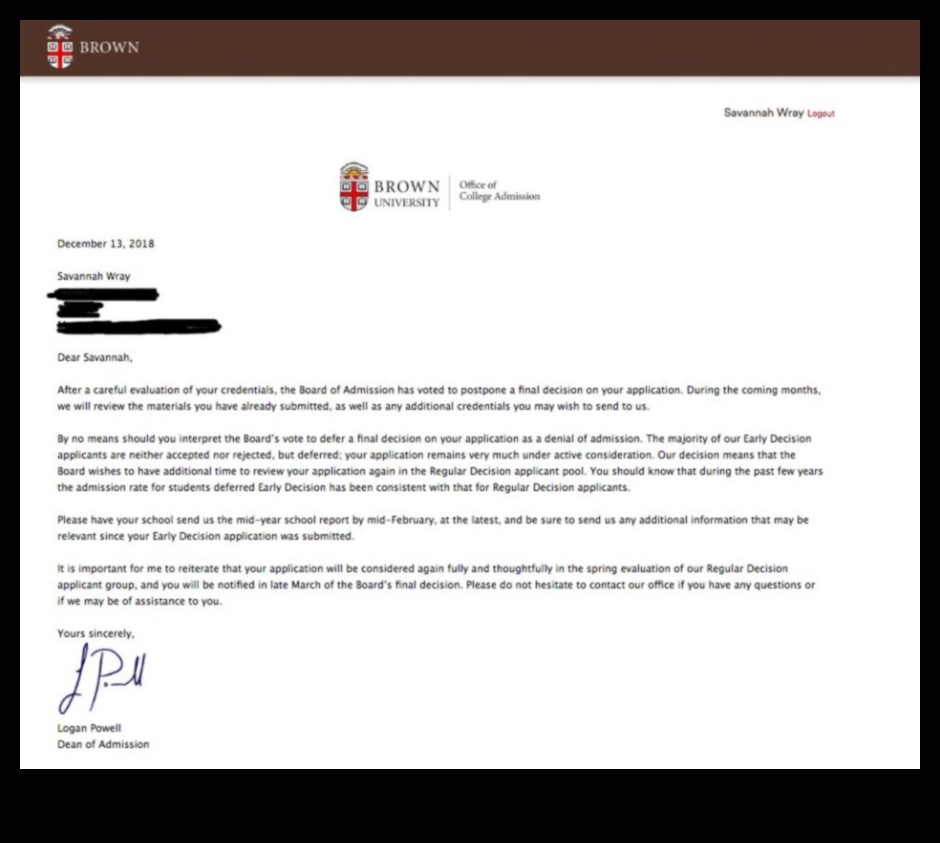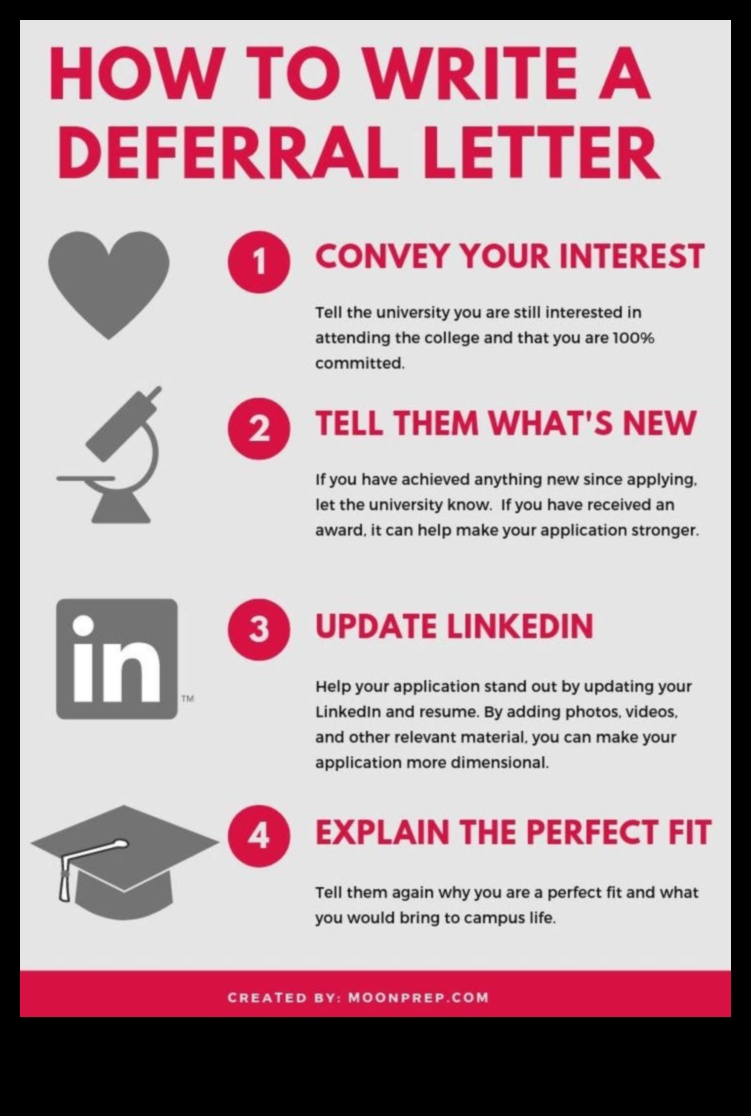
1. What is deferred admission?
Deferred admission is a type of admissions decision that colleges and universities may make to applicants who are strong candidates but who do not have enough space in their incoming class to admit them outright.
2. Who is eligible for deferred admission?
Deferred admission is typically offered to applicants who have applied early decision or early action to a college or university but who are not admitted to their first-choice school.
3. What are the benefits of deferred admission?
The benefits of deferred admission include:
- You will have more time to make a decision about whether to attend the school.
- You will have the opportunity to learn more about the school and its programs.
- You will have the opportunity to improve your academic record and extracurricular activities.
4. What are the drawbacks of deferred admission?
The drawbacks of deferred admission include:
- You may not be admitted to the school after all.
- You may have to compete with a larger pool of applicants for admission in the regular decision round.
- You may have to pay a deposit to the school even if you are not admitted.
5. How do I apply for deferred admission?
To apply for deferred admission, you must submit a letter to the admissions office of the school explaining why you would like to be deferred. You should also include any updates to your academic record or extracurricular activities since you submitted your original application.
6. What are the chances of getting deferred admission?
The chances of getting deferred admission vary from school to school. However, in general, the chances are higher for students who have strong academic records and extracurricular activities.
7. What happens if I don’t get deferred admission?
If you are not deferred admission, you will be considered for admission in the regular decision round.
8. What are the other options for students who don’t get deferred admission?
If you are not deferred admission, you have a few options:
- You can apply to other colleges and universities.
- You can attend a college or university that you were admitted to.
- You can take a gap year and reapply to colleges and universities in the next admissions cycle.
9. What are the common mistakes students make when applying for deferred admission?
The following are some of the common mistakes students make when applying for deferred admission:
- Not submitting a letter to the admissions office.
- Not providing any updates to your academic record or extracurricular activities.
- Not being prepared to pay a deposit to the school.
10. FAQ
- What is the difference between deferred admission and waitlist?
- What happens if I get accepted to a school after I have been deferred?
- Can I apply to other schools while I am waiting to hear back from a school that deferred me?
- What is the best way to tell a college that I want to be deferred?
| Feature | Definition |
|---|---|
| College admissions deferral | When a college or university delays making a decision on an applicant’s application until a later date |
| Deferred admission | The status of an applicant who has been deferred by a college or university |
| College admissions process | The process by which colleges and universities evaluate and admit students |
| Early decision | A binding admissions process in which students apply to a college or university and commit to attending if they are admitted |
| Regular decision | The traditional admissions process in which students apply to a college or university and are notified of their admission decision in the spring |

What is deferred admission?
Deferred admission is a type of admissions decision that allows a college or university to hold off on making a final decision about a student’s application until a later date. This is typically done for students who are strong candidates for admission but who may not have all of the requirements that the college or university is looking for at the time of their initial application.
Who is eligible for deferred admission?
Deferred admission is typically offered to students who apply to a college or university early decision or early action. Early decision and early action are two admissions programs that allow students to apply to a college or university before the regular admissions deadline. In exchange for applying early, students who are admitted early decision or early action are required to commit to attending that college or university if they are offered admission.

What are the benefits of deferred admission?
There are a few benefits to being deferred from a college or university. First, it gives you more time to improve your application. This could mean taking more courses, getting better grades, or strengthening your extracurricular activities. Second, it allows you to compare your offers from different colleges and universities. This can help you make the best decision about where to attend college. Third, it can give you a chance to build a relationship with the admissions office at the college or university you are interested in. This can be helpful if you are ultimately admitted, as the admissions office will already be familiar with you and your application.

What are the drawbacks of deferred admission?
There are a few drawbacks to being deferred from a college or university. First, it is not a guarantee of admission. In fact, the majority of students who are deferred from a college or university are not ultimately admitted. Second, it can be stressful to wait to find out if you will be admitted. This can be especially difficult if you are waiting to hear from your top choice college or university. Third, deferred admission can make it more difficult to negotiate financial aid. This is because colleges and universities are more likely to offer financial aid to students who have already been admitted.
How do I apply for deferred admission?
If you are deferred from a college or university, you will typically be given the option to apply for deferred admission. To do this, you will need to submit a letter to the admissions office explaining why you believe you should be admitted. You will also need to update your application with any new information that has occurred since you initially applied.
What are the chances of getting deferred admission?
The chances of getting deferred admission vary from college to college. In general, the more competitive the college or university, the lower the chances of being deferred. However, there are no hard and fast rules, and each college or university will have its own admissions policies.
What happens if I don’t get deferred admission?
If you do not get deferred admission, you will need to decide whether to reapply to the college or university for regular decision. You may also want to consider applying to other colleges and universities.
What are the other options for students who don’t get deferred admission?
If you do not get deferred admission, you have a few options. You can choose to reapply to the college or university for regular decision. You may also want to consider applying to other colleges and universities. You can also choose to attend a college or university that you were admitted to.
What are the common mistakes students make when applying for deferred admission?
There are a few common mistakes that students make when applying for deferred admission. First, they do not submit a strong letter of appeal. The letter of appeal is your chance to explain why you believe you should be admitted to the college or university. Make sure to highlight your strengths and why you would be a good fit for the school. Second, they do not update their application with any new information. The admissions office will want to know if you have done anything since you initially applied that would make you a stronger candidate. Make sure to update your application with any new grades, extracurricular activities, or awards. Third, they do not follow up with the admissions office. The admissions office is busy, and they may not be able to get back to you right away. However, it is important to follow up with them to let them know that you are still interested in attending the college or university.
FAQ
3. What are the benefits of deferred admission?
There are a few benefits to being deferred from a college or university.
- You will have more time to improve your application. This could mean taking more challenging courses, getting higher grades, or strengthening your extracurricular activities.
- You will have more time to research the colleges and universities that you are interested in. This will help you make a more informed decision about where to attend college.
- You will have more time to visit the colleges and universities that you are interested in. This will give you a chance to see the campus, meet with students and faculty, and get a feel for the school.
However, it is important to note that being deferred does not guarantee admission. You will still need to submit a strong application for the regular decision round.
4. What are the benefits of deferred admission?
There are a few benefits to being deferred from a college or university.
- You will have more time to think about your decision and whether or not the school is the right fit for you.
- You will have more time to improve your academic record and extracurricular activities.
- You will have more time to strengthen your application and make a stronger case for why you should be admitted.
However, it is important to note that being deferred does not guarantee admission. You will still need to submit a strong application and meet the school’s admissions requirements.
How do I apply for deferred admission?
To apply for deferred admission, you will need to submit a letter to the admissions office of the college or university you are interested in attending. In your letter, you should explain why you are requesting deferred admission and what you have been doing since you submitted your initial application. You should also include any new information that you think would be helpful to the admissions committee in making their decision.
The deadline for submitting a deferred admission request varies from school to school. Be sure to check the admissions website of the college or university you are interested in attending to find out the specific deadline.
Once you have submitted your deferred admission request, you will need to wait to hear back from the admissions committee. The decision process for deferred admission applicants can take longer than the regular decision process, so be patient. If you do not receive a decision by the end of the regular decision period, you can contact the admissions office to inquire about the status of your application.
6. What happens if I don’t get deferred admission?
If you are not deferred, it means that you were not admitted to the school during the early decision round. You will need to apply to the school again during the regular decision round.
If you are not admitted to your top choice school during the early decision round, it can be disappointing. However, it is important to remember that you are still a strong candidate and that you have a good chance of being admitted to other schools.
Here are some things you can do if you are not deferred from your top choice school:
- Don’t give up hope. You are still a strong candidate and you have a good chance of being admitted to other schools.
- Continue to work hard in school and improve your grades.
- Get involved in extracurricular activities that you are passionate about.
- Write a strong personal statement that highlights your unique qualities and why you would be a good fit for the school.
- Reapply to the school during the regular decision round.
Remember, there are many great schools out there and you are sure to find one that is a good fit for you.
What happens if I don’t get deferred admission?
If you are not deferred, it means that your application was not strong enough to be admitted to the school during the early decision round. However, you are still eligible to apply for admission during the regular decision round.
The regular decision round is less competitive than the early decision round, so you have a better chance of being admitted if you apply during this round. However, you should be aware that the regular decision round is also more selective than the early decision round, so you should make sure that your application is as strong as possible.
If you are not admitted to a school during the regular decision round, you can still try to appeal the decision. However, appeals are rarely successful, so you should only appeal if you are confident that there was a mistake in your application or if your circumstances have changed significantly since you applied.
If you are not admitted to any of the schools to which you applied, you can still consider attending a college or university that offers you a spot. You may also want to consider taking a gap year before starting college.
Other options for students who don’t get deferred admission
If you are not deferred, there are still other options available to you. You can:
- Apply to other colleges through the regular decision process.
- Reapply to the college that deferred you next year.
- Take a gap year and reapply to colleges in the following year.
Each of these options has its own advantages and disadvantages. You should carefully consider all of your options before making a decision.
If you decide to apply to other colleges through the regular decision process, you will need to submit a new application and meet the deadlines for each college. You should also be aware that the competition for regular decision spots is typically more intense than it is for early decision spots.
If you decide to reapply to the college that deferred you, you will need to submit a new application and pay the application fee again. You should also be aware that the college may not be as receptive to your application the second time around.
If you decide to take a gap year, you can use the time to improve your academic record, gain work experience, or travel. You can also use the time to reflect on your goals and decide what you want to do with your life.
No matter what option you choose, it is important to remember that you are not alone. Many students are in the same position as you. By carefully considering your options and making a plan, you can increase your chances of getting into the college of your choice.
9. What are the common mistakes students make when applying for deferred admission?
There are a few common mistakes that students make when applying for deferred admission. These mistakes can hurt their chances of being admitted to the school of their choice.
Here are some of the most common mistakes to avoid:
- Not following the instructions carefully.
- Not submitting all required materials on time.
- Not writing a strong personal statement.
- Not showing interest in the school.
- Not following up with the admissions office.
By avoiding these common mistakes, you can increase your chances of being admitted to the school of your choice.
If you are deferred, don’t be discouraged. It is still possible to get admitted to the school. Here are a few things you can do to improve your chances of being admitted after being deferred:
- Continue to show interest in the school.
- Stay in touch with the admissions office.
- Submit additional materials that demonstrate your interest and qualifications.
- Visit the school if possible.
By following these tips, you can increase your chances of being admitted to the school of your choice.
FAQ
Question 1: What is deferred admission?
Answer: Deferred admission is when a college or university accepts a student’s application but holds their decision until the regular decision round. This means that the student will not know if they have been admitted until after all of the regular decision applicants have been considered.
Question 2: Who is eligible for deferred admission?
Answer: Not all colleges and universities offer deferred admission, and the criteria for eligibility vary from school to school. However, in general, students who are eligible for deferred admission are those who have strong academic records and extracurricular activities, but who may have been slightly below the admissions medians for their desired school.
Question 3: What are the benefits of deferred admission?
Answer: There are a few potential benefits to applying for deferred admission. First, it gives you the chance to improve your academic record and extracurricular activities in the time between the early decision and regular decision rounds. Second, it can give you more time to think about your college decision and make sure that you are choosing the right school for you. Finally, deferred admission can be a way to show colleges that you are truly interested in their school and are willing to wait to hear back from them.